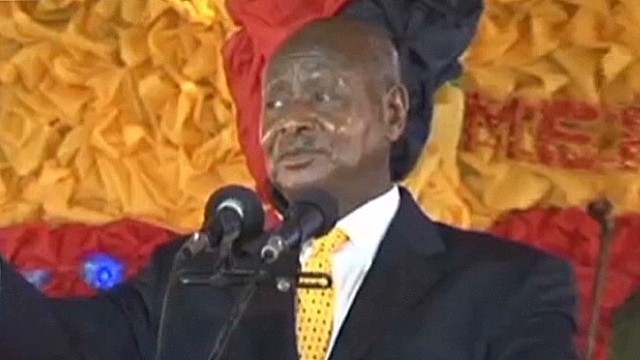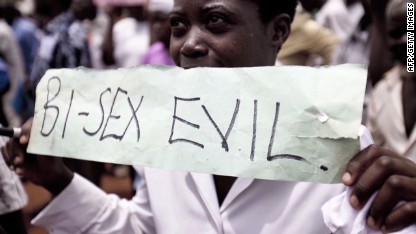

Kampala, Uganda (CNN) -- Uganda's president Saturday vowed to sign sweeping anti-gay legislation, citing what he said were scientific, not political, considerations for a controversial measure in a country that already criminalizes homosexuality.
In a statement, President Yoweri Museveni declared debate on the legislation over and said he was not concerned about the expected international outcry. His remarks, made during a conference of the ruling National Resistance Movement, drew loud applause from supporters.
"We shall have a war with the homosexual lobby in the world, but backed by these people (scientists) and you," he told supporters.
A Ugandan lawmaker first introduced the bill in 2009 with a death penalty clause for some homosexual acts. It was briefly shelved when Britain and other European nations threatened to withdraw aid to Uganda, which relies on millions of dollars from the international community.
The nation's parliament passed the bill in December, supplanting the death penalty provision with a proposal of life in prison for "aggravated homosexuality." It includes acts where one person is infected with HIV, "serial offenders" and sex with minors, Amnesty International said.
In cases where one has HIV, the punishment applies even when the sex is consensual or protected.
Museveni said that scientists examining the issue determined there was no gene for homosexuality and that it was merely abnormal behavior. He said in a statement that he sought "a scientific ... not a political answer. Let the scientists answer this. And according to the way they have answered it, if they mislead us, they are the ones who are responsible."
He said, "The question I put to them was, are there people born like this? Now they are saying they are no such people."
According to Amnesty International, the bill's definition of "aggravated homosexuality" includes acts in which a person is infected with HIV, "serial offenders" and sex with minors.
The bill also proposed years in prison for anyone who counsels or reaches out to gays and lesbians, a provision that would ensnare rights groups and others providing services to lesbian, gay, bisexual and transgender people.
Homosexuality is illegal in most African countries, where sodomy laws were introduced during colonialism. According to Amnesty International, homosexuality is illegal in 38 of 54 African countries. In Uganda, homosexual acts are punishable by 14 years to life in prison, according to rights activists.
But lawmakers in the conservative nation sought tougher legislation, saying the influence of Western lifestyles risks destroying family units.
Homosexuality is taboo in African countries and activists say few Africans are openly gay, fearing imprisonment, violence and loss of their jobs.
Museveni appears to be balancing the desire to please a conservative constituency vehemently opposed to homosexuality with hopes of not alienating Western aid donors to the east African country.
Last month, he declined to sign the bill, but the move was not designed to protect the civil rights of gays and lesbians. Museveni believed that Parliament illegally passed the bill, and gays and lesbians are "sick people who need help," his spokesman said at the time.
The president had sent a letter to the speaker of Parliament, saying that he couldn't sign the bill because there weren't enough Parliament members present when it was passed.
"Homosexuals need help. They are sick," spokesman Tamale Mirundi said, explaining the president's thinking. "Homosexuals were present in Africa in the past and were not persecuted."
At the ruling party conference this week, however, Museveni said he was persuaded of the need to sign the bill by his scientific advisers, who cited, among other reasons, the "serious public health consequences" of homosexuality.
Where last month, the president, through his spokesman, seemed to perceive homosexuality as an illness, now Museveni seemed to be following the lead of a government committee that declared Friday that homosexuality is "not a disease but merely an abnormal behavior which may be learned through experiences in life."
In a statement, the New York-based Center for Constitutional Rights said the bill would "place the lives of countless Ugandans at risk" and "had already intensified the climate of hatred and persecution" against gay people in Uganda.
"The international community has a legal and moral obligation to prevent this law from being implemented," the center said.
No comments:
Post a Comment